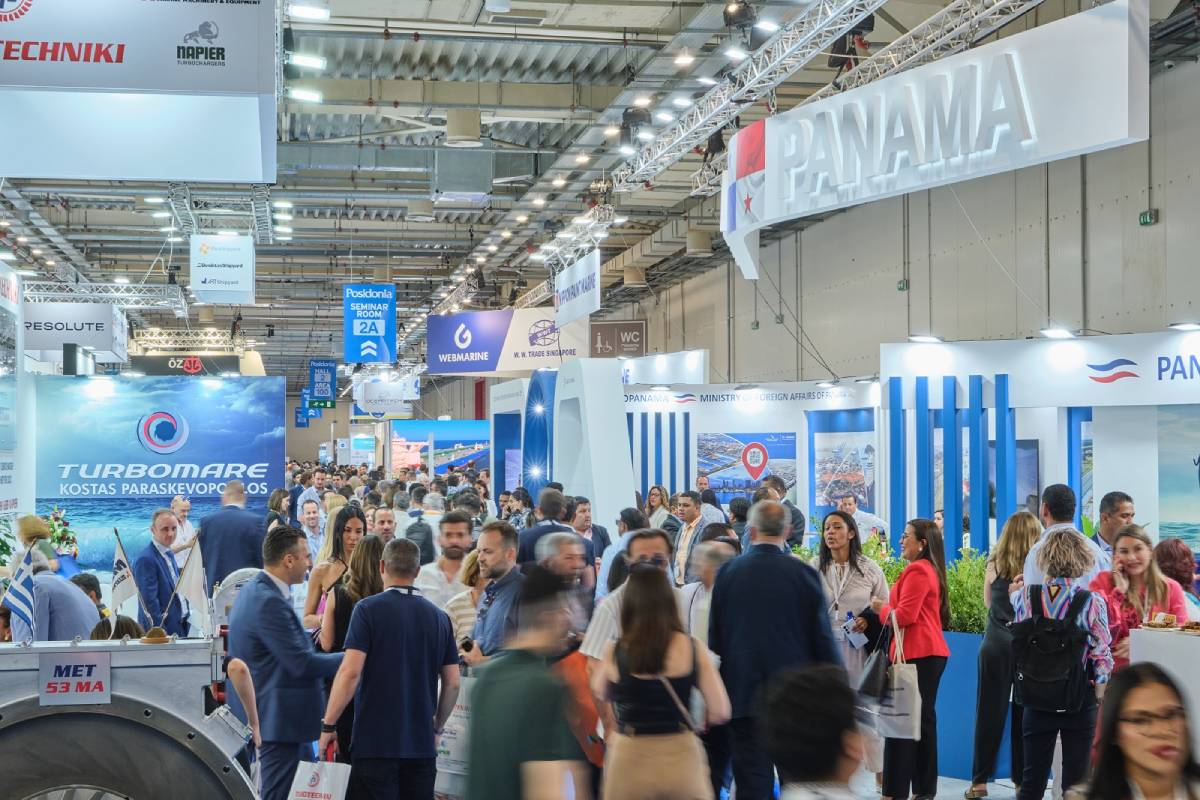Sixteen ship registries from across the globe are participating in Posidonia 2024 to showcase their innovations and competitive strategies.
These registries aim to navigate the complex and evolving landscape of the international shipping industry, addressing challenges related to sanctions, financial pressures, safety, and new environmental regulations.”
“Sanctions compliance, fleet monitoring, and enforcement of all the IMO instruments are the main challenges we are currently facing,” said Gianluca Tucci, General Director of the San Marino Registry, a brand-new player which chose Posidonia 2024 as the launching pad for its merchant vessel offering.
Over the past few years, increased sanctions have placed a growing burden on ship registries. Flags and classification societies have responded by suspending and removing more ships and operators from their ranks.
To prevent “flag hopping” and other deceitful practices, leading international flags like the Panama Maritime Authority, the Liberian Registry, and the Marshall Islands Registry have agreements for the exchange of information.
“Vessels change flags due to various reasons, so it is important for the registries like us to have a cooperation with other peers to ensure that the owners we are dealing with are credible and of a high-quality standard. This exchange of information can be very helpful especially with the proliferation of the shadow fleet,” said Carla Elena Peralta, a spokeswoman on behalf of Panama Maritime Authority.
Furthermore, shifting markets and supply chains have increased financial pressures on ship operators. As a result, there has been a rise in abandonments and lax compliance with safety regulations.
“The dynamic nature of ship registration also renders the necessity to upgrade, improve, and respond to changing demands of the market a necessity for survival,” said Dr. Ivan Tabone, Registrar General, Malta Ship Registry.
In addition, some advocate eliminating the concept of ship nationality altogether, which would shift the responsibility of supervision and enforcement away from flag registries.
To stay ahead of developments and improve their competitiveness, flag registries are introducing various initiatives in the areas of Digitalization and Blockchain to streamline processes, improve transparency, and enhance security.
“We must stress the use of new technologies by applying digitalized services in addition to implementing the best working conditions for all seafarers without forgetting the environment and the shift to decarbonize shipping,” said Richard Medawar, Deputy General Ships Registrar of Guinea Bissau International. The Registry is making its Posidonia debut this year as an exhibitor to promote its brand and services and communicate its added values and strengths to a broader audience of marine industry professionals and network with existing and potential new customers.

The digital transformation wave is spearheading flag registries’ efforts to reduce red tape as an enabler for a more seamless vessel registration process. At Posidonia 2024, the Greek flag launched a new application for the digitization of the application for registration and granting of a document of nationality of Greek seagoing vessels, niologio.gov.gr. The new application, which is a perennial request of the shipping community, reduces bureaucracy and speeds up registration procedures, strengthening the competitiveness of the Greek flag. Thanks to the digitization of the entire process, the ship’s nationality document, which carries a unique QR Code for immediate verification of its authenticity by any competent authority around the world, is automatically generated and granted directly to the ship-owning company.
Panama Maritime Authority is also in the process to launch a platform and an app to facilitate online vessel registration process according to Peralta.
Palau International Ship Registry (PISR) digitalised its registration process before the pandemic and is now offering a full range of online services and applications, along with full Electronic Certification that enables it to provide smooth, faster, efficient and cost-effective services.
PISR’s CEO Panos Kirnidis said: “One of the key advantages of PISR is our in-house Deficiency Prevention System (DPS), which ensures that vessels comply with international conventions, rules and regulations. DPS is fully administrated by PISR with the main objective to introduce a more preventive and risk-based approach to targeted ships for inspection and to enhance quality status on PISR vessels.
Flag registries are also focusing on green issues, emphasizing their environmental compliance and sustainability strategies by offering incentives for eco-friendly practices, such as reduced fees for vessels meeting emission standards or using alternative fuels.
For example, the British Virgin Islands Registry (BVI), better known for its yachting offering, is developing a comprehensive policy spanning various ministries to incentivize green shipping practices, benefiting ship registration, port calls, and beyond. The exotic Registry is strategically expanding its global presence with plans to establish offices in the Mediterranean, Dubai, Singapore, and Florida and is eager to forge partnerships with the green propulsion technology industry, aligning with its commitment to fostering cleaner seas through mutually beneficial associations. John Samuel, Director, said: “We return to Posidonia for the ninth time this summer to meet potential clients from the merchant marine community and promote the flag’s commitment to green shipping.”
International cooperation between them, port authorities, and other maritime bodies is also another area of focus for flag registries, as part of their contribution to a more cohesive and competitive global maritime ecosystem.
“Although cost matters are always at the forefront of customers’ consideration, flag selection goes well beyond that,” added Dr. Ivan Tabone. “One of the major challenges of all major international ship registries is the ability to strike the right balance between addressing the needs of our customers without compromising the quality of service provided and compliance with the applicable regulations and standards.”
On the issue of ship registration fees and the annual tonnage charge (ATC), the Hong Kong Ship Registry (HKSR) is offering waivers for the first year of ship registration for applicable ships newly registered with HKSR. “To enhance the competitiveness of HKSR and provide greater facilitation for shipowners, we will continue to enhance our ship registration services and suitably employ digitalization to facilitate the process of ship registration,” said S.F. Wong, Director of Marine. “Our policy as a special administrative region is not to seek any profit from ship registration fees, and most services are provided on a cost-recovery basis.”
The following flag registries are exhibiting at this year’s Posidonia: Bahamas Maritime Authority, Barbados Maritime Ship Registry, Cayman Registry, Croatian Register of Shipping, Cyprus Shipping Deputy Ministry, Hong Kong Shipping Registry, International Merchant Marine Registry of Belize (IMMARBE), IRI / The Marshall Islands Registry, Liberian Registry, Maritime Malta, Guinea Bissau, Palau International Ship Registry, Panama Maritime Authority, San Marino Ship Register, Sierra Leone Maritime Administration, St. Kitts & Nevis International Ship Registry, and Virgin Islands Shipping Registry.
Posidonia 2024 is organised under the auspices of the Ministry of Maritime Affairs & Insular Policy, the Hellenic Chamber of Shipping and the Union of Greek Shipowners and with the support of the Municipality of Piraeus and the Greek Shipping Co-operation Committee.






